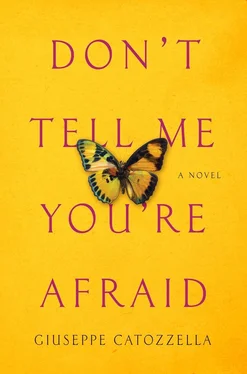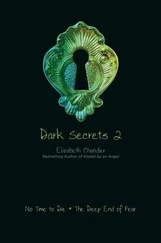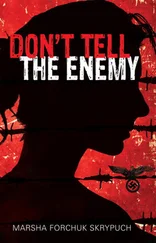Another three months here in Tripoli without being able to leave the house for fear of being hounded by the police results in a lot of talking. There was a brief time, during the clashes and then right after the death of dictator Gadhafi at the end of 2011, when the situation was calmer. An absence of government means an absence of law. And without law even we tahrib were less tahrib . No one thought about us then because nobody was hunting us anymore. The traffickers were without work and a passage to Italy was cheap.
But now they’ve regrouped.
Worse than before. They say that if you, a tahrib, are found on the street, they’ll send you straight back to the Sahara.
After I came back to Tripoli, I had to call Hodan and Hooyo again. But this would be the last money I’d ask for. This time, finally, I was going to make it.
I paid again, and here I am with Nigist, waiting for them to call and tell me it’s time to leave. After you pay it’s best to stay put in the house, because they could come at any time.
But now I’ve been told I’ll leave tonight. This time they gave me a little advance notice, three hours, because the boat is big, they said, and there are a lot of us. My last three hours as a tahrib .
I’m used to departures: In eight months I’ve left at least six or seven times. I don’t even have any bags to pack. Always the same three things: Aabe’s headband, Hooyo’s handkerchief with the seashell, the photo of Mo Farah.
Nigist and I will say good-bye when the time comes. Not before. During the Journey you don’t do anything before you have to. There’s no time for the past, there’s no time for the future; only living in the present moment helps us survive, to stay alive. Practical things like good-byes don’t fall into that category, so they are done only when the time comes.
Besides, we’ll meet again later on; we’ve already talked about it.
Like me, Nigist too will come to live in Helsinki; we want to build a community of women from the Horn of Africa. Reproduce the colors of our countries in that distant, cold place.
I am very fond of Nigist; I’ll miss her very much until we meet again.
Last night I spoke with Hodan via Skype, and with Mannaar as well. She’s almost four years old, and by now it’s clear that she looks exactly like me. There is a period, during the first two or three years as a child grows, when her appearance might take on any semblance whatsoever: She’s not yet defined; she’s just a sketch. By four years of age, however, she is what she was intended to be; she is already what she will be. Mannaar looks exactly like her aunt Samia. She resembles me more than she does her mother.
Hodan enrolled her at the gym a year ago.
She’s been running for more than ten months now. Hodan was right about her; evidently mothers really do understand everything about their children, even before they are born. Mannaar has a flair for running; she’s the fastest in her group. She has already won her first two races. And with those short little legs too. She’s already so fast.
I’m her idol, that’s what Hodan told me. One of the first words Mannaar uttered was “Tie Amia,” Auntie Samia. She keeps my photograph — a newspaper clipping from the time of Beijing — next to her bed, as I did with Mo Farah’s.
Each time I see her on Skype, I’m struck by how alike we are. Physically, two peas in a pod. But not only that. When she moves and talks, I feel like I’m seeing myself in miniature.
“Come soon,” Mannaar told me last night. “Auntie Samia…” She paused. ”Don’t let the monsters come…. Don’t say you’re afraid.”
Hodan and I both burst out laughing.
“No, little Mannaar, I’m not afraid. Ever,” I told her.
Tonight I’m leaving at last.
It’s time to leave; it’s time to finally get there. I’m tired of this waiting. And tonight my aunt Mariam will also leave with me: She’s one of Aabe’s older sisters, whom I ran into by chance here in Tripoli when I went out to get the cans of water one day. She’d been living in an apartment nearby for nearly a month, and I didn’t even know it.
She too was arrested three times during the Journey; she too is weary and needs a place where there’s no war, a place from which you don’t have to flee.
Tonight we leave and soon we’ll find peace.
We’ll find peace.

THE BOAT IS BIG, much bigger than I had imagined. It’s an actual boat; the other one was a dinghy.
There are a great many of us, men, women, and children, from infants to the elderly; once more we seem like a crowd of excited, hopeful ghosts. There is no fear in our eyes; our gaze is focused far ahead, already looking beyond the sea.
We met at the port around eleven o’clock at night.
Aunt Mariam was there too. She’s exhausted. She came with a woman friend with whom she made the Journey from Mogadishu. On the boat she found a place inside; I preferred to stay out on deck, to breathe in the smell of the sea, like a foretaste of the smell of freedom, the smell of Italy, of Europe.
The sea, the sea at last! It’s the second time I’m seeing it up close like this. It’s heaving slowly, gently, awaiting us.
There are about three hundred of us in all. Truly a great many. We make an impressive sight. Silent ghosts. The tremor in our bodies is a mixture of anxiety and hope. No one talks about it, because to talk about it would be to name one or the other. And naming things makes them real, so for tonight better not to. Better to keep anxiety locked up inside us and let hope grow, slowly perhaps, during the journey. Only then, only at the end, will we be able to rejoice, and do so all together. We’ll weep and laugh together, and it will be wonderful. Like when we were in the trailer with the sacks of corn flour.
Not now, though; now is a time for silence. And prayer.
When they told us to board, we boarded.
Then we set off.
This time it’s longer than the earlier three hours in the dinghy.
The voyage is smooth sailing, swift and steady. The sea is docile; our hull easily plows through it. Some sleep, others don’t. I don’t. I stay at the prow as long as I can to catch the breeze, until the cold becomes too intense and the night too dark. I stay there enjoying the wind and looking north, awaiting the land of freedom.
Then the first day is over.
We don’t have much to eat, except for a little angero and moffa , a grain and corn flour mush. As usual, they haven’t let us bring anything on board, because of weight. Not even water.
In fact, the water is all used up after a day and a half. A few try to say something; others even start shouting at the traffickers, but it’s just to be doing something; it serves no purpose other than to mark time, going through the necessary motions that someone has to make.
After two days we’re forced to drink water from the bottom of the boat’s barrels. I would never have done it after the fever I caught in Khartoum, but I see that others are drinking it and not getting sick, so I drink it too. It’s disgusting; it tastes of iron and urine. I find a small container and bring a little to Aunt Mariam, who must be thirsty.
“It’s horrible,” I tell her. “But it’s all there is.”
She’s so dehydrated, her mouth parched, that she drinks it all in one gulp.
“Thank you, sweetheart,” she replies in a faint whisper. Since they got on the boat, she and her friend haven’t once moved from those seats. Lifeless, they sleep, pray, and eat what little the traffickers give us. They sit there, stock-still, staring out at the endless expanse of sea that separates us from freedom.
Читать дальше





![Ally Carter - [Gallagher Girls 01] I'd Tell You I Love You But Then I'd Have to Kill You](/books/262179/ally-carter-gallagher-girls-01-i-d-tell-you-i-lo-thumb.webp)







